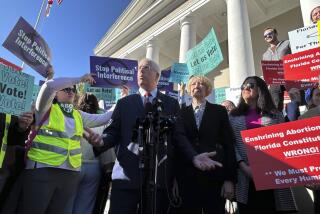Florida governor turns Voting Rights Act rule on its head
Since the 1960s, state and local officials in the South have been required by law to seek advance approval from the Justice Department in Washington before making changes in their election rules, a legacy of the era when blacks were denied the right to vote.
But in an unusual twist, new Florida Gov. Rick Scott, a Republican, is using the pre-clearance requirement in the Voting Rights Act to stall enforcement of a voter-approved initiative that bars partisan gerrymandering.
Longtime champions of voting rights are crying foul.
“This is a bizarre situation. It turns the law on its head” because it uses a reform law to block a reform measure, said Laughlin McDonald, director of the ACLU’s Voting Rights Project in Atlanta.
The pre-clearance rule was adopted by Congress in 1965 as a temporary measure, but it has been continued ever since. It has been credited with ending schemes that kept blacks from voting or deprived them of political power. For example, some cities chose to switch away from districts and to citywide elections for city council whenever blacks had a majority to win a district seat.
The rule continues to rankle Southern officials, particularly when they are called upon to redraw their election districts with new census data. Two years ago, however, the Supreme Court stopped just short of striking down the rule as hopelessly outdated.
“Things have changed in the South,” said Chief Justice John G. Roberts Jr. He noted that a higher percentage of blacks were registered to vote in some Southern states that are covered by the law than in some Northern and Western states that are not.
The Florida situation also shows that a well-intentioned rule can have unintended consequences.
In November, 63% of Florida’s voters approved an amendment to the state constitution that forbids lawmakers from drawing electoral districts to favor their party or to protect incumbents. The measure was opposed by prominent state politicians. Since Republicans have a majority in both houses of the state Legislature and control the governor’s office, they could draw electoral districts to give the GOP an edge for the next decade in Tallahassee and in the state delegation to the U.S. House of Representatives.
In December, outgoing Gov. Charlie Crist sent the required pre-clearance request to Washington. But last month, shortly after taking office, Scott quietly withdrew the request. He later told reporters he wanted more time to consider the issue.
The Justice Department says the Voting Rights Act “freezes election practices and procedures” in much of the South until they are reviewed and approved in Washington. “That means that voting changes in the covered jurisdictions may not be used until that review has been obtained,” it advises. Well over 99% of the changes are quickly approved.
On Tuesday, the department gave its expected approval to California’s switch to an independent commission to redraw its election districts. California comes under the federal pre-clearance rule because four of its counties — Monterey, Merced, Kings and Yuba — had less than half of their residents registered to vote in the early 1970s.
Unlike California, Florida cannot move ahead to implement its nonpartisan redistricting rules until a top state official asks for and receives permission from Washington.
Last week, the League of Women Voters, the Florida chapter of the National Assn. for the Advancement of Colored People and the American Civil Liberties Union sued Scott in federal court in Florida, seeking an order that would require the governor to submit the pre-clearance to Washington.
“It’s time to stop the stonewalling,” said Dan Gelber, counsel for Fair Districts Now, the group that sponsored the ballot measure.
“This is extraordinary. I’ve never seen anything like it,” said Richard Pildes, a New York University law school expert on election law. “The governor is essentially using a federal law obligation that binds the states to attempt to avoid enforcing a state law that he apparently would prefer the state had not adopted.”
This year, in Florida and in other states, legislative committees and independent commissions are redrawing electoral maps based on data from the 2010 census. But until the legal dispute is settled in Florida, it is unclear whether its lawmakers must abide by the anti-gerrymandering rules that were added to the state’s constitution.
More to Read
Start your day right
Sign up for Essential California for news, features and recommendations from the L.A. Times and beyond in your inbox six days a week.
You may occasionally receive promotional content from the Los Angeles Times.







